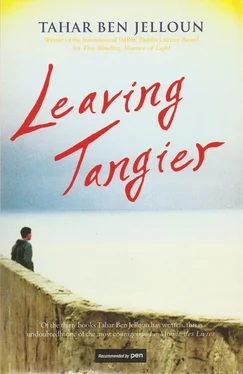Tahar Ben Jelloun - Leaving Tangier
Здесь есть возможность читать онлайн «Tahar Ben Jelloun - Leaving Tangier» весь текст электронной книги совершенно бесплатно (целиком полную версию без сокращений). В некоторых случаях можно слушать аудио, скачать через торрент в формате fb2 и присутствует краткое содержание. Год выпуска: 2009, Издательство: Arcadia Books, Жанр: Современная проза, на английском языке. Описание произведения, (предисловие) а так же отзывы посетителей доступны на портале библиотеки ЛибКат.
- Название:Leaving Tangier
- Автор:
- Издательство:Arcadia Books
- Жанр:
- Год:2009
- ISBN:нет данных
- Рейтинг книги:5 / 5. Голосов: 1
-
Избранное:Добавить в избранное
- Отзывы:
-
Ваша оценка:
- 100
- 1
- 2
- 3
- 4
- 5
Leaving Tangier: краткое содержание, описание и аннотация
Предлагаем к чтению аннотацию, описание, краткое содержание или предисловие (зависит от того, что написал сам автор книги «Leaving Tangier»). Если вы не нашли необходимую информацию о книге — напишите в комментариях, мы постараемся отыскать её.
Leaving Tangier — читать онлайн бесплатно полную книгу (весь текст) целиком
Ниже представлен текст книги, разбитый по страницам. Система сохранения места последней прочитанной страницы, позволяет с удобством читать онлайн бесплатно книгу «Leaving Tangier», без необходимости каждый раз заново искать на чём Вы остановились. Поставьте закладку, и сможете в любой момент перейти на страницу, на которой закончили чтение.
Интервал:
Закладка:
When his mother began to speak, her tone was melodramatic.
‘You see, my son, I don’t know how much more time God will grant me in this life, so you know what obsesses me: to see you married, to see your children playing in my house and making noise, lots of noise… I would not like to die without experiencing such wonderful moments. You know, your cousin, lovely Sabah, she’s waiting for you, she just refused a rich and quite promising suitor; Sabah thinks about you, her mother confirmed that to me yesterday. Come, take a wife and give me grandchildren. May God grant me life and your presence at my deathbed.’
Azel said nothing beyond the conventional phrase: ‘May God grant you health and may your blessing protect me.’
Protected … he didn’t feel protected at all. How had he managed to get himself mixed up in so many conflicts? He saw himself at an intersection, unable to cross; in the rush of cars coming from all directions, he felt like a headless puppet. After everything he’d lived through that past month, how could he possibly find himself? How could he find peace? There was someone inside him driving him to sabotage his own life.
Possessed. That’s what his mother would have said about him.
They’ve cast a spell on you. They’ve hunted you. The evil eye, hatred, jealousy. There, my son, is the explanation for everything that is happening to you. You cannot imagine what malice springs up in people, in life, whenever anyone stands out from the crowd; they try to hurt you: you’re handsome, intelligent, successful (you managed to leave, in any case, and make a fine career for yourself in Spain), so you unleash ferocious hatred, dreadful envy — oh, we’re all persecuted by the evil eye, and I know, you young people today, you don’t believe in it, you think logic is everything, that nothing happens beyond what you see, but you must learn to see what doesn’t show itself, because even our prophet Lord Mohammed recognized the existence of the evil eye. Jealousy can wreak havoc, just look at what befell that poor Hanane: she’s beautiful, educated, from a good family, and was going to marry an engineer, from an important clan, so everything was ready, even the invitations were printed, and you know what happened to her? No, she didn’t die: worse! She was abandoned by her fiancé, who preferred to marry her aunt! So the evil eye, I know it well. My son, don’t forget to read the Koran: God will protect you. Know that from where I am, far from you, I never stop blessing you, you and your sister.
37 . Kenza
ALERTED BY THE EMERGENCY SERVICE of the Red Cross, Miguel emerged from his voluntary seclusion to sit at the bedside of his wife, who had tried to commit suicide. Kenza was frighteningly pale, with dull, empty eyes. An unhappy love affair. A cruel disappointment. She had suddenly lost all desire to live. When she did not answer Miguel’s questions, he felt that her silence was the result of some specific trauma, that something dreadful must have happened. Miguel searched her handbag and pulled out a book of poems, Human Landscapes , by Nâzim Hikmet. He looked at the photograph Kenza had used as a bookmark. It showed her next to a tall man, darkly handsome, with a moustache. They were standing in front of a restaurant called the Kebab. Miguel wondered if Kenza might recover her power of speech if she could see the man in the picture again, and with the doctor’s encouragement, he began to search for him. It took Miguel some time to find the Kebab, a modest hole-in-the-wall squeezed between a dry cleaner’s and a cellphone store. The chairs were dirty and the tables were covered in plastic. An old man was nodding behind the counter, but when he saw Miguel arrive in his beautiful coat, he jumped as if the king in person had just walked in. Miguel narrowed his eyes; there was a poster on the back wall with the picture of some actor or singer, and when Miguel looked more closely, he thought he recognized the man beside Kenza in the photograph.
The old man smiled at Miguel.
‘Ah, you too are an admirer of our national star! All the women are crazy about him. He’s a magnificent singer.’
‘Where does he live?
‘He’s the kind who has palaces wherever he goes. Everyone is a fan, whatever the government: left, right, military, civilian, Muslim, secular — he’s always loved and applauded.’
‘He doesn’t live in Spain?’
‘No, he came last year for a television special. Thanks to Touria, our prettiest waitress, we had the honour of receiving him here. He even sang without any music because there were some thirty compatriots in the room who kept clamouring for a song.’
‘Who is he?’
‘His name’s Ibrahim Tatlises,* which means “sweet voice”! He’s from Urfa, southeastern Turkey, not far from the Syrian border. He’s a lady-killer. Wherever he sings, husbands hide their wives. Touria cries at the very sound of his voice.’
Miguel showed the man the photo.
‘Do you know this woman?’
‘Her, no, but the man, yes, he worked here for a few months. He kept mostly to himself. I don’t know where he’s gone. He never gave me any cause for complaint. Did he do something wrong? Wait a minute, it’s true, he does look like Ibrahim, but of course it’s not the same man!’
Miguel stammered a few words of thanks and promptly left that dark and dreary place. Suddenly he realized that Kenza had fallen in love with love. She wanted a man in her life, and had thought she’d found him in Nâzim.
How had that quiet girl, apparently so levelheaded, who’d worked to put herself through nursing school and done so well there — how had she convinced herself that this man she hardly knew was eager to start a family with her? Once again, Miguel felt somewhat responsible for this mistake, and especially for the present crisis. He reflected that he should have kept a better eye on her, paid attention to what she was doing, introduced her to people and even men who might have made her happy. This mysterious and seductive Nâzim had clearly hoped to obtain papers, perhaps even to become a Spanish citizen through Kenza, who had never considered — or rather, had refused to consider — that possibility. She had defiantly decided that he would be her husband and the father of her children. The lovers had spoken about it only once, though, and Nâzim had been difficult to pin down. Kenza had talked about it with her mother, however, who’d been pressing her for a long time to find a husband. Lalla Zohra believed in the affair with Nâzim and was sure Kenza had found the right man. In reality, her daughter had done nothing but concoct a fantasy that fulfilled her every desire: to get married, be like everyone else, have children right away, and above all, go home at last with her head held high to make her mother happy. Nâzim had come along, and Kenza had chosen him to play the main role in her story. Nâzim had never had any inkling of what was actually going on. Now, Kenza’s world had collapsed. The blow had been devastating.
She had to be saved, brought back to reality, persuaded to accept therapy. She had to forget that man and perhaps even consider returning to Morocco in the end. Miguel now realized that there was something terrifying about the loneliness of immigration, a kind of descent into a void, a tunnel of shadows that warped reality. Kenza had let herself be caught in the maze, and Azel, well, he had gone desperately wrong. Exile revealed the true dimensions of calamity. Miguel remembered how much the long psychoanalysis he had undergone had helped him with this aspect of his life, perhaps even saving that same life. But Kenza was no more inclined at present than Azel to lie down on a couch and talk about the secrets of the soul… A question of culture and tradition, and money, too. In any case, they both thought that only crazy people went to psychiatrists.
Читать дальшеИнтервал:
Закладка:
Похожие книги на «Leaving Tangier»
Представляем Вашему вниманию похожие книги на «Leaving Tangier» списком для выбора. Мы отобрали схожую по названию и смыслу литературу в надежде предоставить читателям больше вариантов отыскать новые, интересные, ещё непрочитанные произведения.
Обсуждение, отзывы о книге «Leaving Tangier» и просто собственные мнения читателей. Оставьте ваши комментарии, напишите, что Вы думаете о произведении, его смысле или главных героях. Укажите что конкретно понравилось, а что нет, и почему Вы так считаете.












